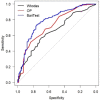DEVELOPMENT AND VALIDATION OF A PSYCHOLOGICAL SCALE FOR BARIATRIC SURGERY: THE BARITEST
- PMID: 36102490
- PMCID: PMC9462854
- DOI: 10.1590/0102-672020220002e1682
DEVELOPMENT AND VALIDATION OF A PSYCHOLOGICAL SCALE FOR BARIATRIC SURGERY: THE BARITEST
Abstract
Background: It is recommended that bariatric surgery candidates undergo psychological assessment. However, no specific instrument exists to assess the psychological well-being of bariatric patients, before and after surgery, and for which all constructs are valid for both genders.
Aims: This study aimed to develop and validate a new psychometric instrument to be used before and after bariatric surgery in order to assess psychological outcomes of patients.
Methods: This is a cross-sectional study that composed of 660 individuals from the community and bariatric patients. BariTest was developed on a Likert scale consisting of 59 items, distributed in 6 constructs, which assess the psychological well-being that influences bariatric surgery: emotional state, eating behavior, quality of life, relationship with body weight, alcohol consumption, and social support. Validation of BariTest was developed by the confirmatory factor analysis to check the content, criteria, and construct. The R statistical software version 3.5.0 was used in all analyses, and a significance level of 5% was used.
Results: Adjusted indices of the confirmatory factor analysis model indicate adequate adjustment. Cronbach's alpha of BariTest was 0.93, which indicates good internal consistency. The scores of the emotional state, eating behavior, and quality of life constructs were similar between the results obtained in the community and in the postoperative group, being higher than in the preoperative group. Alcohol consumption was similar in the preoperative and postoperative groups and was lower than the community group.
Conclusions: BariTest is a reliable scale measuring the psychological well-being of patients either before or after bariatric surgery.
RACIONAL:: Recomenda-se que os candidatos à cirurgia bariátrica sejam submetidos a uma avaliação psicológica. Contudo, não existe nenhum instrumento específico para avaliar os pacientes bariátricos, e que todos os construtos sejam válidos para ambos os sexos.
OBJETIVOS:: Desenvolver e validar um novo instrumento psicométrico para avaliar o bem-estar psicológico dos pacientes antes e após a cirurgia bariátrica.
MÉTODOS:: O estudo foi transversal e composto por 660 indivíduos da comunidade e pacientes bariátricos. O BariTest foi desenvolvido numa escala Likert composta por 59 itens, distribuídos em seis construtos, que avaliam o bem-estar psicológico que influenciam a cirurgia bariátrica: estado emocional, comportamento alimentar, qualidade de vida, relação com o peso corporal, consumo de álcool, e suporte social. A validação do BariTest foi feita pela validação de conteúdo, critério e construto e utilizou-se análise fatorial confirmatória. O software estatístico R versão 3.5.0, foi utilizado em todas as análises, com um nível de significância de 5%.
RESULTADOS:: Os índices ajustados do modelo análise fatorial confirmatória indicam um ajustamento adequado. O alfa de Cronbach do BariTest foi 0,93, o que indica uma boa consistência interna. As pontuações de estado emocional, comportamento alimentar e qualidade de vida foram semelhantes na comunidade e no grupo pós-operatório, sendo mais elevados do que no grupo pré-operatório. O consumo de álcool foi semelhante nos grupos pré e pós-operatórios e foi inferior ao do grupo comunitário.
CONCLUSÕES:: O BariTest é uma escala confiável que mede o bem-estar psicológico dos pacientes antes e após a cirurgia bariátrica.
Conflict of interest statement
Conflicts of interest: None
Figures
References
-
- American Educational Research Association, American Psychological Association, National Council on Measurement in Education . Standards for educational and psychological testing. Washington: American Educational Research Association; 2014.
-
- Brasil F, Brasil AMB, Correr CJ. Validation of the Brazilian version of WHODAS 2.0 in patients with mental disorders: should the 12-Item Scale be an Alternative to 36-Item Scale in DSM-5? Neuropsychiatry (London) 2018;8(2):719–726. doi: 10.4172/Neuropsychiatry.1000397. - DOI
MeSH terms
LinkOut - more resources
Full Text Sources
Medical




